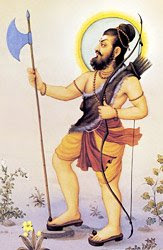Parashurama Avatara is the sixth Incarnation of the Dasavatars of Vishnu. His actual name was Jamadagnya but since childhood he moved around with his formidable weapon, the battle-axe or Parashu which combined with his pet name Rama led to his being called Parashurama by which we all know him.
Parashurama appeared on earth to purge it of the tyranny of the corrupt Kshatriya clan, born to Jamadagni Muni and his chaste wife Renuka. The angry warrior stance of Parashurama, was inherited from Jamadagni, son of Princess Satyavati and Rucheeka, the great sage. Rucheeka gifted both Satyavati and his mother a magical herbal concoction for conception of a male child to continue the lineage. Parshurama’s grandmother Satyavati made the blunder of interchanging the potion. Jamadagni, with a royal temper and bravery was born to Rucheeka, instead of a peace-loving hermit. Her first four sons were studious Brahmin boys.
He went off the Himalayas for austere penance and won the favor of the great god Shiva who granted him a boon pleased with his formidable austerities. Parshurama asked for mastery over all weapons rather than wealth or learning. Shiva taught him how to use the battle-axe, making him invincible and also the greatest archer of the day.
Parashurama is noted among the Dasavatars for his hot temper. Once, Kartivirarjuna, king of the Haiyahayas, and his troops ventured out for an expedition in the forest. Weary, after the day`s toil they feasted at the nearby haven of the sage Jamadagni. When the king inquired about the secret of served delicacies, Jamadagni revealed that it was because of Kamdhenu, the divine cow offered by Lord Indra to him, who had the power to confer instant favor. Allured, the greedy king demanded Kamdhenu but Jamadagni refused since the cow was a gift from Indra. Heedless, the arrogant king ordered the royal soldiers to snatch away Kamdhenu, to their capital at Mahishmati. Kartivirarjuna was a thousand-armed king who had once humbled the great Ravana, but had now become somewhat of a demon himself.
On his return from the forest, when Parashurama heard of the incidence he fumed and left with his deadly axe to punish Kartivirarjuna.
What ensued was a bloody combat between Kartivirarjuna`s army and Parashurama in his wrath hacked the opponents. Finally, he severed the thousand-arms (blessed by Lord Dattareya for his penance) of the heroic king, and slaughtered him. With outstanding victory to his credit, Parashurama returned to the hermitage with Kamdhenu.
Once Renuka’s momentary enchantment by the lovemaking of the Gandharva or Nymph Chitraratha with his wives, while she went to the river for fetching water, made her return home late. Jamadagni, the sage, knowing the reason of her late-coming, was infuriated. He asked his four sons to kill their mother, Renuka to punish her but they were stupefied at the thought of such a horrendous act. Only courageous Parashuram, the fifth son for whom his father’s command was sacrosanct, obeyed the order and killed his mother along with his four brothers. When Jamadagni calmed down, desirous to grant his son with a boon for this prompt action, Parashuram entreated for the restoration of life to his dear ones along with his mother’s original chastity. Jamadagni resurrected all of them. His prayer reflects the love that Parashuram had for his close ones.
Parashurama, along with his brothers, once went out on a mission. The sons of Kartiviryarjuna, eagerly desirous for revenge grabbed the opportunity. Despite Renuka’s fervent pleading to the Kshatriyas to spare her husband`s life, the royal army beheaded the meditating Jamadagni. The adversaries fled with the head of the sage to Mahishmati. Meanwhile the five sons of Jamadagni returning to the ashram, saw the traumatized Renuka, lying in a pool of blood.
Parashurama hurried to Mahishmati to massacre the princes and brought back his father`s head to the ashram; the sons religiously performed the death rituals in honor of the departed Jamadagni.
Nothing could placate the relentless Parashurama, seething with fury, miserable at his father`s murder by the Kshatriyas. Twenty-one times over he clashed with the warrior class, and smashed with his axe, every coercive Kshatriya, filling seven lakes with the blood of his foes. As Vishnu’s avatara he established dharma or righteousness on earth and eliminated evil.
At the end of the massacre, Parashurama, repentant for the bloodshed, decided to do penance at the foot of Mahendra Mountain. But since he had donated all the land that he owned to the pious during religious sacrifices he needed land for a hermitage. Soon enough he threw his axe into the sea and earnestly appealed to Varuna, the Sea-god, to grant him land equal to the stretch that his axe could encompass. He threw it from Gokarnama and it fell on Kanyakumari. The gratified Varuna gave way to a land known as "Parashurama Srishti", the present-day Kerala. Geologically there is some truth to this myth as Kerala is one of the last land areas in India to surface from the ocean. It is believed that prosperity would rule the land and no disease or natural calamity would hamper its peace. Parahurama taught the world's oldest martial art, Kalaripayyattu to the brahmans settled there, his supreme gift.
Parashurama encountered Lord Rama, the next incarnation of Vishnu, when he heard of the unprecedented breaking of the bow, before Rama`s wedding to his consort Sita, acknowledging him as his superior in a trail of strength that involved stringing Vishnu's bow.
Parashurama is an immortal being like Asvathama of the celebrated epic, Mahabharata He will continue to dwell on earth till the Kalki incarnation in the Kali Yuga, being the spiritual tutor for Kalki, in his unique way of devastating evil by Shiva`s grace.


No comments:
Post a Comment